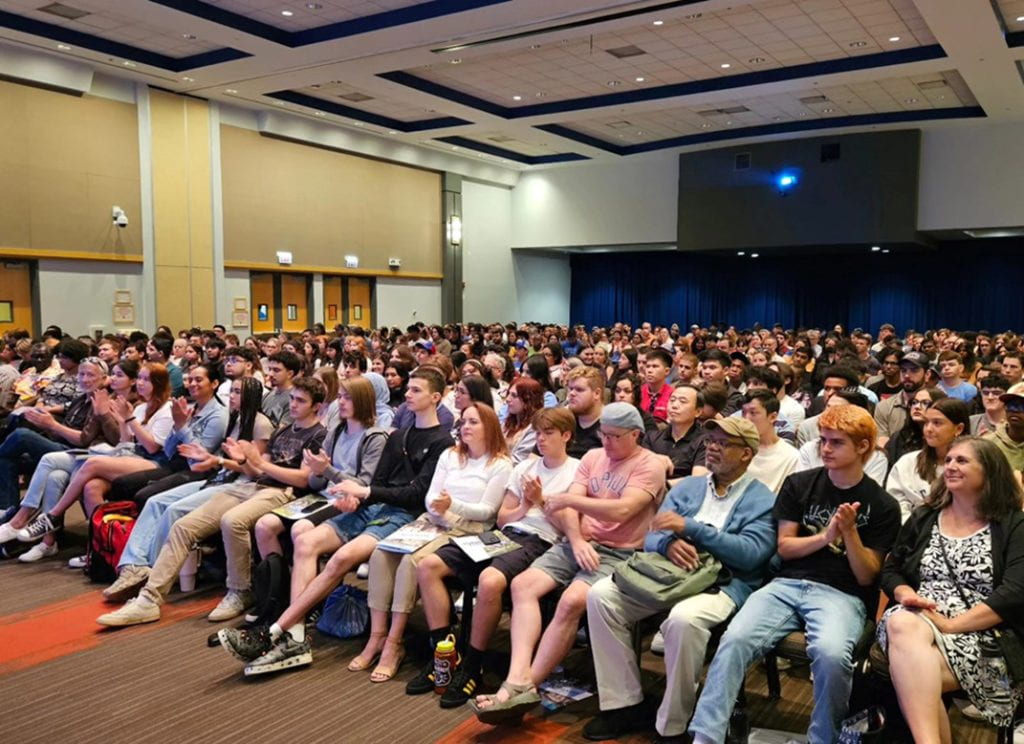Written By: Tom Judge, Chaplain and Assistant Director, Division of Mission and Ministry.
This ‘Best of Mission Monday’ post revisits a reflection on the intertwined spiritual seasons of Lent and Ramadan.

In honor of the Feast of St. Patrick or what we more colloquially know as St. Patrick’s Day, I found myself wondering: What has the relationship been like between DePaul and the Irish (or, as time passed, Irish Americans)? What may be some of the highlights that have marked the special bond between the Emerald Isle and the Little School under the El? As a proud, and curious, Irish American, I decided to do a little investigating.
When our university was founded as St. Vincent’s College in 1898, the City of Chicago had over 1 million citizens, making it the third-largest metropolis on the globe. It was teeming with new arrivals from all over the country and the world, so that fully half the city’s population were either immigrants or the children of immigrants. One of the largest of these migrant communities, and the most Catholic, were the Irish. Most were drawn to Chicago because of the twin opportunities it offered. There was work (in construction, the stockyards or on the railroads and waterways that made Chicago the transportation hub of the United States). And there was also freedom (to worship or advance or express themselves in ways that were not supported in the places from which they came).
To achieve their desired upward social mobility, the new Chicagoans required access to education. To answer this need, the Archdiocese of Chicago asked Vincentian priests to found a school on the city’s North Side for male children of the Catholic immigrant and working classes, most of whom were Irish. [1] One can only imagine the comfort felt by many of these early students when they were addressed by DePaul’s first president, Rev. Peter Byrne, CM, and as they heard the familiar brogue he spoke with as a native of County Carlow in Ireland.
It was DePaul’s third president, Rev. Frances McCabe, CM, himself an Irish American, who sparked early controversy at the young university. In 1919, he presented the man destined to become Ireland’s dominant political personality of the twentieth century, Eamon de Valera, with an honorary degree. De Valera, who had been a leader of the Irish rebellion and only narrowly avoided execution by the British, was then touring the United States to acquire official recognition and money for those across the Atlantic who were battling for Irish independence. DePaul again bestowed an honorary degree upon a president of Ireland, this time Seán Thomas O’Kelly, in 1959. Similarly, the Vincentian priest conveying this honor was another first-generation Irish American, DePaul’s seventh president, Rev. Comerford O’Malley, CM.
Perhaps it was in recognition of this early, and inimitable, connection of the Irish with DePaul that led the Illinois Chapter of the American-Irish Historical Society to move their library to the university in 1927 in hopes of reaching a larger audience. [2] Their choice turned out to be prescient. DePaul’s special collection of Irish literature, begun by the donation from the American-Irish Society, has broadened and deepened over the years. It includes works by W. B. Yeats, Samuel Becket, and Seamus Heaney, all Irish Nobel Prize winners, as well as other authors who represent the best of Irish literature from the nineteenth and twentieth centuries, a time that has come to be known as the Irish Renaissance.
As is the case when we engage with any diverse culture and community, DePaul has been made better by our relationship with the Irish and Irish Americans. To this very day, our university’s touchpoints with the Land of Saints and Scholars remain vital, unique, a little playful, and too numerous to list here. Classes continue to be offered through the university’s Irish Studies Program, and students continue to trek downtown to enjoy the annual St. Patrick’s Day Parade and the dyeing of the Chicago River green.
But there is one more contemporary connection between DePaul and Ireland that deserves to be highlighted. In just a few days, a study abroad class centered around Irish Literature will leave Chicago for Dublin. As part of their curriculum, the class instructors have arranged for their students to spend time engaging in community service with local Daughters of Charity—the order of religious women founded by Sts. Vincent de Paul and Louise de Marillac—in the Irish city of Cork. This coming together in Ireland, of peoples from near and far, in the Vincentian spirit of relationship and service calls to mind the long-ago days of the 1640s, when Vincent de Paul first sent a small group of missionaries from France to serve on the distant shores of Ireland. Vincent de Paul could have been speaking for many of us, Irish or not, who look with fondness towards this small island across the sea, when he wrote to the Bishop of Limerick upon their departure, “Would to God that I were worthy to be one of their numbers. God knows how willingly I would go.” [3]
Reflection Questions:
- Whether it be wearing green, ordering a serving of corned beef and cabbage, or attending a social gathering to mark the occasion, do you have any special St. Patrick’s Day memories or rituals that you celebrate?
- What might be a cultural heritage that you treasure? How do you celebrate or observe this heritage?
- Consider the new arrivals coming to Chicago in 2025. Do we as a university or larger community welcome their presence and affirm their dignity, as our Vincentian mission urges us to do?
Reflection by: Tom Judge, Chaplain and Assistant Director, Division of Mission and Ministry
[1] From its earliest days, DePaul was unique among higher education institutions in admitting students from many faith traditions, not just Catholic, without quotas being attached. Unfortunately, at the beginning we were less inclusive when it came to women, not admitting our first female students until 1911.
[2] “The Enduring Legacy of Rare Gifts: Irish Collection,” Department of Special Collections and Archives, DePaul University Library, March 12, 2025, https://dpuspecialcollections.omeka.net/exhibits/show/enduring/irish.
[3] Sean T. O’Kelly, “St. Vincent and the Irish,” DePaul Magazine, Spring 1959, p. 10, https://cdm16106.contentdm.oclc.org/digital/collection/depaulmag/id/3184/rec/1. To read the letter itself see, Letter 876, To Edmund Dwyer, Bishop of Limerick, 15 October 1646, CCD, 3:90.








